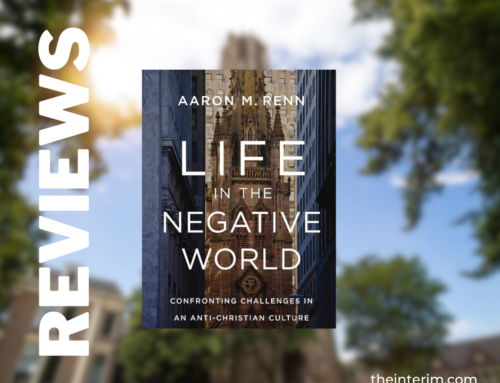What is essential
Good news for once. The Wall Street Journal reported that churches in America and Europe are pushing back against restrictions on worship services during the second wave of the COVID-19 pandemic, arguing that they are not the locus of spreading the coronavirus. In other words, they are arguing that churches are safe as long as certain protocols (namely masking, distancing, and no singing) are followed. Many churches were deferential to severe restrictions in the spring, often limiting capacity to below levels permitted by commercial enterprises. Such compliance was understandable when we were told that such restrictions were temporary measures necessary for a few weeks. Understandable but mistaken. Such deference undermines the very teachings of Christian churches. In sheepishly following orders to close and then severely restrict church services, Christian leaders are going along with the government’s understanding of what institutional faith is: a non-essential service. When grocery stores were allowed to open but not restaurants and clothiers, for example, churches were thrown into the mix with business, not-for-profit, and charitable enterprises that are not considered essential. Why would a pastor or bishop go along with that? As an acquaintance of mine who works for a minister in the Boris Johnson government said, “If the bishops believe what they say they believe, they are the most essential service, and yet they accepted being closed down with indetectable pushback.” At the very least, a strong stand on the importance of church would have been a teaching moment for the faithful, including some who are only C&E Christians.
A group of British faith leaders wrote a letter to Prime Minister Boris Johnson last month pushing back against renewed restrictions on worship services. It said, “We have demonstrated, by our action, that places of worship and public worship can be made safe from Covid transmission.” This is the wrong argument. It is the churches’ uncritical acceptance of safety, indeed, the fetishization of bodily health and safety, that continues to belie the teachings of the Christian churches and undermines what religious leaders should prioritize: the health of the soul. Nothing is more essential than saving souls from hell.
I am not arguing that as Christians we should be indifferent to our health and safety, and of those around us. Indeed, the commandment to love our neighbours means taking reasonable precautions to keep them safe. But more importantly, we must attend to our spiritual health and safety. And while we, as individuals, may forget this, it is deeply disappointing that our church leaders do as well.
It is my fervent hope and prayer that we nourish our souls this Christmas season by being able to celebrate the birth of Jesus in our churches, with our fellow Christians. I am glad that as Christmas services are just around the corner, more religious leaders are speaking up, including the Catholic Diocese of Brooklyn, which is challenging New York state restrictions on worship service at the Supreme Court. And I am heartened that Supreme Court Justice Samuel Alito has spoken out about restrictions on religious service as a violation of the U.S. Constitution’s First Amendment.
Meanwhile, here in Canada, the Justice Center for Constitutional Freedoms, led by Interim columnist John Carpay, is fighting a lonely battle against governments’ pandemic restrictions. It would be nice if religious leaders in this country were to join him in this fight to protect the spiritual health of Canadians.
**
As of my last-minute writing of this column Joe Biden’s margin of victory in four states was 10,457 (Arizona), 14,028 (Georgia), 20,564 (Wisconsin), and 33,596 (Nevada). The total electoral vote total for those four states is 43, and Biden won the Electoral College by 36 votes. This is not quite “every vote counts” but it shows that showing up can matter. The more important takeaway, however, appreciating the benefit of the Electoral College, like Canada’s first-past-the-post system, is that it exaggerates the results of the election to affirm the winner’s legitimacy. This is how the founders wanted it, and they were wise to do so. At the same time the slim victory should be a reminder how precarious victory was for the Democrats and they might want to curtail some of their more radical policy preferences.
I am not interested in litigating the election outcome. There were definitely some fishy things going on, but I agree with the wisdom in Dan McLaughlin’s argument at National Review Online in late November, “We should fight the Biden administration, not Biden’s election.” McLaughlin said the American conservative movement has broken into two camps: “One camp believes that Joe Biden was not the legitimate winner of the 2020 election and sees the drive to ‘Stop the Steal’ as an existential test of both conservatism and American democracy” and another that “accepts that Biden actually won the election — or, at a minimum, that no legitimate pathway exists to prove otherwise — and is looking ahead to how conservatives can defend and advance their goals over the next four years and plan on recovering the White House.” I believe the margins of victory, as slim as they are, are nigh impossible to overcome. Election officials and judges have acted improperly and sometimes illegally, but there are no viable correctives to these acts of malfeasance. With the incoming Biden team announcing that it will reverse the Mexico City Policy, which prohibits U.S. taxpayer money from being used to promote or carry out abortion globally, in its first week in office, pro-life Republicans and conservatives should likewise be ready on day one of the Biden administration to promote a pro-life agenda and, at the very least, be prepared to resist the Democrat’s limitless abortion agenda. There is a time for campaign and a time for governing and a time for opposing. Pro-life Americans would be wise to begin thinking about how to resist the Biden administration’s more radical inclinations.
**
Marie Stopes International changed its name to MSI Reproductive Choices to distance itself from the eugenic views of its namesake, the early 19th century Britih birth control advocate. Stopes opposed interracial marriage and, much like Planned Parenthood founder Margaret Sanger, supported sterilizing so-called inferior people. National Review’s Kevin D. Williamson commented on the name change: “Now that those awful eugenicists have been memory-holed, Planned Parenthood et al. can go back to butchering unborn children exclusively for respectable reasons.” I often think that we pro-lifers get sucked into political games and end up talking about racism (abortionists setting up shop disproportionately in poor, black neighbourhoods, the common but now unfavourable views of early abortion advocates) or sexism (gender-selective abortions). We would do well to remember that abortion is always a wicked act of killing a helpless preborn child.
–Paul Tuns




